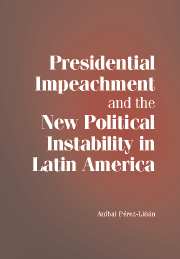Book contents
- Frontmatter
- Contents
- List of Tables and Figures
- Preface and Acknowledgments
- 1 INSTITUTIONAL CRISES IN PRESIDENTIAL REGIMES
- 2 FIVE CASES OF IMPEACHMENT AND A PRESUMED MADMAN
- 3 PRESIDENTIAL CRISES AND THE DECLINE OF MILITARY INTERVENTION
- 4 LATIN AMERICA IN THE AGE OF SCANDAL
- 5 SCANDALS AND THE POLITICAL ECONOMY OF POPULAR OUTRAGE
- 6 BUILDING A LEGISLATIVE SHIELD: THE INSTITUTIONAL DETERMINANTS OF IMPEACHMENT
- 7 TOWARD A NEW PATTERN OF POLITICAL INSTABILITY
- 8 RETHINKING LATIN AMERICAN PRESIDENTIALISM
- References
- Index
- Titles in the series
2 - FIVE CASES OF IMPEACHMENT AND A PRESUMED MADMAN
Published online by Cambridge University Press: 25 July 2009
- Frontmatter
- Contents
- List of Tables and Figures
- Preface and Acknowledgments
- 1 INSTITUTIONAL CRISES IN PRESIDENTIAL REGIMES
- 2 FIVE CASES OF IMPEACHMENT AND A PRESUMED MADMAN
- 3 PRESIDENTIAL CRISES AND THE DECLINE OF MILITARY INTERVENTION
- 4 LATIN AMERICA IN THE AGE OF SCANDAL
- 5 SCANDALS AND THE POLITICAL ECONOMY OF POPULAR OUTRAGE
- 6 BUILDING A LEGISLATIVE SHIELD: THE INSTITUTIONAL DETERMINANTS OF IMPEACHMENT
- 7 TOWARD A NEW PATTERN OF POLITICAL INSTABILITY
- 8 RETHINKING LATIN AMERICAN PRESIDENTIALISM
- References
- Index
- Titles in the series
Summary
On the afternoon of October 2, 1992, Brazilian President Fernando Collor de Mello boarded the helicopter that regularly took him from Planalto, the presidential palace, to his nearby home in Brasília. It could have been a normal day, but it was not. Two days before, the Chamber of Deputies had suspended the president from office and initiated an impeachment process that would ultimately end his administration. The event certainly came as a surprise to many Brazilians accustomed to presidential dominance and political impunity, but the short helicopter ride sent shock waves throughout the rest of Latin America. Over the next decade, five other presidents would meet Collor's fate.
This chapter traces the political processes leading to five cases of impeachment and one declaration of presidential incapacity between 1992 and 2004. This period constituted the foundational moment for a new pattern of instability in Latin America, and the experiences of Fernando Collor, Carlos Andrés Pérez, Ernesto Samper, Abdalá Bucaram, Raúl Cubas Grau, and Luis González Macchi epitomize such a pattern. Who were these presidents? Why did they face an impeachment process? Did they share some common characteristics that made them vulnerable and exposed their administrations to failure?
Comparison of the six episodes suggests some intriguing findings. These presidents had followed very different political careers before winning the presidential race. They were backed by different constituencies, operated in different institutional environments, presided over very different economies, and embraced somewhat different policies. However, they all faced a few similar challenges.
- Type
- Chapter
- Information
- Publisher: Cambridge University PressPrint publication year: 2007



